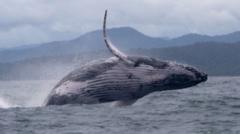Researchers are astounded by a humpback whale's 13,000 km journey from Colombia to Zanzibar, possibly driven by climate change. This remarkable migration raises questions about the changing behavior of marine life as environmental conditions shift.
Humpback Whale’s Remarkable Journey: 13,000 km Migration Stuns Scientists

Humpback Whale’s Remarkable Journey: 13,000 km Migration Stuns Scientists
A humpback whale's unprecedented migration from Colombia to Zanzibar showcases the potential impacts of climate change on marine species.
A humpback whale has made one of the most remarkable migrations ever documented, spurring scientific astonishment and raising critical questions about climate change's effect on marine ecosystems. The whale, initially spotted off Colombia's Pacific coast in 2017, reemerged near Zanzibar in the Indian Ocean several years later, covering an estimated distance of 13,000 kilometers.
Scientists theorize that the whale's extensive journey could be attributed to climate change, which may have impacted the availability of crucial food sources like krill. Ekaterina Kalashnikova from the Tanzania Cetaceans Program remarked on the extraordinary nature of the whale's migration, stating it was "truly impressive and unusual," even for a species known for its migratory habits.
This specific humpback whale is thought to have traversed between two distant breeding areas, marking this journey possibly as the longest recorded for its kind. While humpback whales generally embark on migratory patterns between tropical breeding grounds and their cooler feeding habitats, this particular individual demonstrated an even more extensive route, which some researchers believe might be driven by the search for food or potentially new mating grounds due to rising populations facilitated by global conservation efforts.
Possible contributing factors to this unusual migration may include alterations in climate, the frequency of extreme environmental events, and evolutionary adaptations. Identified in several photographs taken from a research vessel in Colombia in 2013, and again in 2017 and off Zanzibar in 2022, the whale's near 13,046 km great-circle distance underscores its extraordinary journey.
The research findings, which leverage citizen science data and advanced artificial intelligence to track humpback whales by their unique tail patterns, have been published in the journal Royal Society Open Science. The collective input from researchers and whale enthusiasts through platforms like happywhale.com played a crucial role in documenting these incredible migrations.
Through their findings, scientists are eager to further understand the implications of climate change on marine life and the ongoing shifts in migratory behaviors of species like the humpback whale.




















